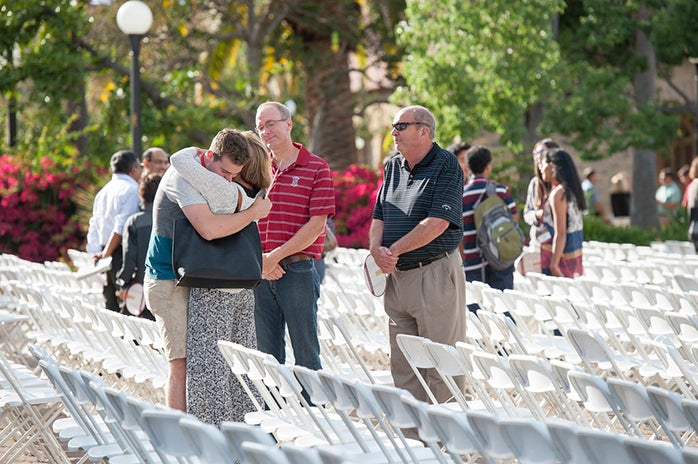What it means to be part of Stanford

Inspired by great books and minds, President John Hennessy this week told Stanford’s newest students that a college education is more than just preparation for a job – it is the foundation for lifelong learning, enrichment and curiosity.
Hennessy was one of several speakers at the university’s 125th Opening Convocation who addressed a crowd of more than 3,500 on the Inner Quad – including 1,722 members of the Class of 2019 and 15 transfer students.
During the past 15 years, Hennessy, who is stepping down as president at the end of this academic year, often focused his Convocation address around his summer reading, which sometimes included books about historical figures. For this year’s speech, the president chose insights from nine of those figures – Theodore Roosevelt, Charles Darwin, Nelson Mandela, George Washington, Peter the Great, Sara Josephine Baker, Benjamin Franklin, Abraham Lincoln and Steve Jobs.
In opening, Hennessy noted that some questions in the college world are timeless. “How do I find my passion?” “What am I really good at?” “How can I make the most of my time here?”
A young Theodore Roosevelt reflected on what it means to be a college student, Hennessy said. “He had two characteristics we value most in students: curiosity and a passion for learning. Indeed, his entire life was an intellectual journey, just as we hope yours will be.”
Like Roosevelt, who experienced many ups and downs early in his adult life and became president after William McKinley’s assassination, Stanford students must prepare for unexpected changes and twists in fate. “Opportunities rarely come on your schedule,” Hennessy said.
He noted that an undergraduate education is much more than a ticket to one’s first job. “It is an opportunity to develop skills as a lifelong learner. It is the foundation for your entire life.”
Hennessy recounted Charles Darwin’s relationship with John Henslow, a botanist and geologist who encouraged a young Darwin’s interest in science. Stanford faculty, the president said, represent similar transformative figures for students.
“Alumni have told us that getting to know a faculty member was one of the most rewarding aspects of their Stanford experience. Our faculty have a passion for learning and a desire to share their knowledge. Get to know them outside of the classroom as well,” said Hennessy.
Nelson Mandela is another beacon of inspiration for Hennessy. “A tale of resilience, determination and justice, his life story also has remarkable lessons about human relations,” he said.
Hennessy said that when Mandela counseled fellow activists in prison, white jail keepers took notice and gradually became sympathetic to the cause of justice for black South Africans. He noted that Mandela wrote: “Familiarity … would not breed contempt, but understanding, and even, eventually, harmony.”
At Stanford, the values of intellectual diversity and tolerance are prized, Hennessy said. When new students first arrive on campus, he said, they often encounter challenges to their preconceptions and belief systems. Over time, the key is to discover new understandings and appreciations for the pluralistic society in which we all live, he noted.
